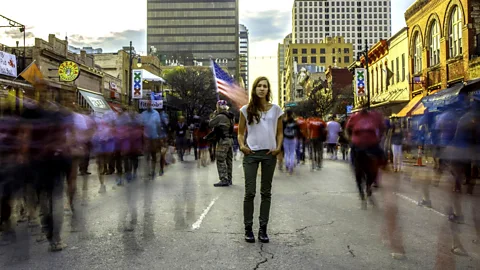How do you make friends in a new country?
 Getty Images
Getty ImagesFor expats working on assignments in new countries, building a social circle can be the toughest challenge of all. Readers share their tips for meeting new people in strange places.
For those of us who live abroad, moving to a new country comes with a host of challenges – from weird cultural quirks to finding a place to live. But one of the toughest is meeting new people: indeed, one of our most popular stories from last year was a piece about dating in Sweden, which examined loneliness many expats feel when trying to settle in abroad. So we posed the question: How have you made friends after moving to a new country? Many of you responded with innovative, thoughtful and novel ideas.
After working in the Middle East, Africa, USA as well as mainland Europe, “where all social life was dictated by work colleagues”, Mark Richard Adams found himself starting a new project in Norway in 1991.
“At first it was just another country, just another project, but then I joined a gym, learned to ski… and started walking in the mountains. Through these activities I started to develop a network of friends outside of work.
 Getty Images
Getty Images“Almost 26 years later I am living permanently in Norway, married to a fantastic Norwegian lady and we have an 11-year-old son. Norwegians are not easy to get to know so you have to be patient [but] it's worth the wait. I have done my best to learn about the language, the culture, history and the politics, it helps.”
For Jeannie Liu , the key was being persistent. “I tried going back to the same place again and again, like a restaurant, or a supermarket. Eventually I got to know the people and was invited to all sorts of gatherings. Then I met more people and made more friends.”
A common language always helps, she says, but “even without a common language, just keep on smiling and be nice to everyone; listen to people… and of course be considerate of the people around you.”
Social networking, online and off
 Getty Images
Getty ImagesJoining groups on social networking site Meetup saved Christine Ndirangu when she moved to London, UK. “It's such a fast-paced life it was hard to get to meet even the few people I knew from before. Luckily Meetup is for people looking to do exactly that. I was surprised that even native Londoners used it to expand their social networks after their old friends settled down and didn't want to get out much.
“Can't say I made any lifelong friends but at least I got to go out and do fun stuff.”
In a similar vein, for Caro Chan, dancing and language meet-ups were a good point to start making new friends in the UK. But she found it harder in Japan, where most local friends were met through work.
 Getty Images
Getty ImagesBeing part of a faith community was “huge” for Dave Kelly. “Common faith helps transcend cultural differences, breaks down potential barriers to friendships and brings people of different nationalities together,” he writes, responding to our question.
After living abroad for five years, Nayim Amaridevised four main tactics for settling in: accept the other, respect their differences, learn about the new culture and meet new people.
'A degree of fearlessness'
For others, it’s not quite as simple as that. For Emilia Bergoglio, who lives in Japan, carving out a social life in her adopted country hasn’t been easy: “Very simply, I haven't [made friends].”
She writes that colleagues aren’t meant to be your friends, and other foreigners tend to stick together. “Only now that my local language skills have improved I am able to have a conversation with the locals, but relationships are mostly on the level of polite acquaintance.
“I am not upset with the situation, and when I desperately need to talk I Skype old friends back in Europe. I am also starting a new job soon, so maybe the situation will change in the near future.”
 Getty Images
Getty ImagesDavid W. Duffy felt equally lonely, even after ten years in Poland, but says an independent spirit is crucial. “There needs to be a degree of fearlessness, and a strong enough mentality to be able to handle the loneliness, which can be crippling at the best of times.
“People who are more attached to home comforts and family will struggle a lot more. However, I wouldn't change it at all – for me, the sense of adventure is far more powerful.”
